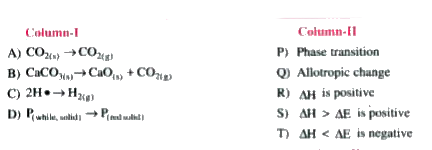For the reaction 2H2(g)+o2(g)→2H2O(g),ΔH∘=−573.2kJ. The heat of decomposition of water per mol is: Solution in Telugu
286.6kJ
573.2 kJ
−28.66 k Cal
68.56 kCal
The correct Answer is:A, D
For decompsition +573.2→2 mol
? → 1mol
Δ=573.22 = 286.6kJ/mol = 68.56 Kcal/mol
Topper's Solved these Questions
- BOOK - AAKASH SERIESCHAPTER - CHEMICAL THERMODYNAMICSEXERCISE - PRACTICE SHEET (EXERCISE- II) (LEVEL- II (ADVANCED) LINKED COMPREHENSION TYPE QUESTIONS)5videos
CHEMICAL THERMODYNAMICS
- BOOK - AAKASH SERIESCHAPTER - CHEMICAL THERMODYNAMICSEXERCISE - PRACTICE SHEET (EXERCISE- II) (LEVEL- II (ADVANCED) MATRIX MATCHING TYPE QUESTIONS)2videos
CHEMICAL THERMODYNAMICS
- BOOK - AAKASH SERIESCHAPTER - CHEMICAL THERMODYNAMICSEXERCISE - PRACTICE SHEET (EXERCISE- II) (LEVEL- II (ADVANCED) STRAIGHT OBJECTIVE TYPE QUESTIONS)4videos
CHEMICAL THERMODYNAMICS
- BOOK - AAKASH SERIESCHAPTER - CHEMICAL THERMODYANMICS EXERCISE - Questions For Descriptive Answers28videos
CHEMICAL THERMODYANMICS
- BOOK - AAKASH SERIESCHAPTER - ELECTRON MIGRATION EFFECTS EXERCISE - QUESTIONS FOR DESCRIPTIVE ANSWERS10videos
ELECTRON MIGRATION EFFECTS
Similar Questions
Enthalpy of neutralization is defined as the enthalpy change when 1 mole of acid/base is completely neutralized by base/acid in dilute solution. For strong acid and strong base neutralization net chemical change is H+(aq)+OH−(aq)→H2O(l),ΔH0r≡−55.84kJ/mol
If enthalpy of neutralization of CH3COOH by NaoH is -49.86 kJ/mol then enthalpy of ionisation of CH3COOH is02:10View SolutionMatch the following columns
 01:26View Solution
01:26View SolutionFor the real gases reaction 2CO(g)+O2(g)→2CO2(g),ΔH=−560kJ. In a 10L rigid vessel at 500K, the initial pressure is 70 bar and after reaction it becomes 40 bar. The change in internal energy is:
View SolutionHow does heat of neutralisation value change with the chemical nature of acid and base?
02:49View SolutionHyperconjugation effect is also termed as 'no bond resonance'. Why?
03:24View SolutionCombustion of hydrogen in a fuel cell at 300 K is represented as 2H_(2(g))+O_(2(g)) rarr 2H_(2)O_((g)) . If Delta H and Delta G are -241.60 kJ mol^(-1) and -228.40 kJ mol^(-1) of H_(2)O . The value of DeltaS for the above process is
03:01View SolutionFor the reaction, 2H_(2)(g)+O_(2)(g) to 2H_(2)O(g), DeltaH=-573.2kJ The heat of decomposition of water per mole
03:18View SolutionFor the reaction 2H_(2)(g)+O_(2)(g) to 2H_(2)O(g), DeltaH^(ө)=-573.2kJ The heat of decomposition of water per mole is
03:19View SolutionWith the help of a thermochemical equation, calculate Delta_(f)H^(@) at 298 K for the following reactions : "C(graphite)" + O_(2)(g) rarr CO_(2)(g) , Delta H = -393.5 kJ//mol H_(2)(g) + (1)/(2)O_(2)(g) rarr H_(2)O(l) , Delta_(f)H^(@) = -285.8 kJ//mol CO_(2)(g) + 2H_(2)O(l) rarr CH_(4)(g) + 2O_(2)(g) , Delta_(f)H^(@) = +890.3 kJ//mol
02:21View SolutionIn the reaction 2H_(2)(g) + O_(2)(g) rarr 2H_(2)O (l), " "Delta H = - xkJ
02:10View SolutionFind the bond energy of the C - H bond form the following data
(a)CH4(g)+2O2(g)→2H2O(g)+CO2(g)ΔH=−803.3kJ(b)C (graphite)→C(g)ΔH=+711.3kJ(c)2H2(g)→4H(g)ΔH=+866.1kJ(d)2H2O(g)→2H2(g)+O2(g)ΔH=+485.3kJ(e)CO2(g)→C(graphite)+O2(g)ΔH=+393.3kJ04:20View SolutionWhich statement is ture for reaction ? 2H_(2) (g) + O_(2) (g) rarr 2H_(2) O (g)
03:06View SolutionThe heat change accompanying the reaction
2H2(g)+O2(g)→2H2O(l) :
ΔH=−136kcal is called02:21View SolutionFor the thermochemical equation,
2H2(g)+O2(g)→2H2Ol,ΔH=−571.6kJ
Heat of decomposition of water is :00:57View SolutionFor the reaction, 2H_(2)O(g) rarr 2H_(2)(g) + O_(2)(g), Delta H = 571.6 kJ Delta_(f) H^(theta) of water is:
06:53View Solution

